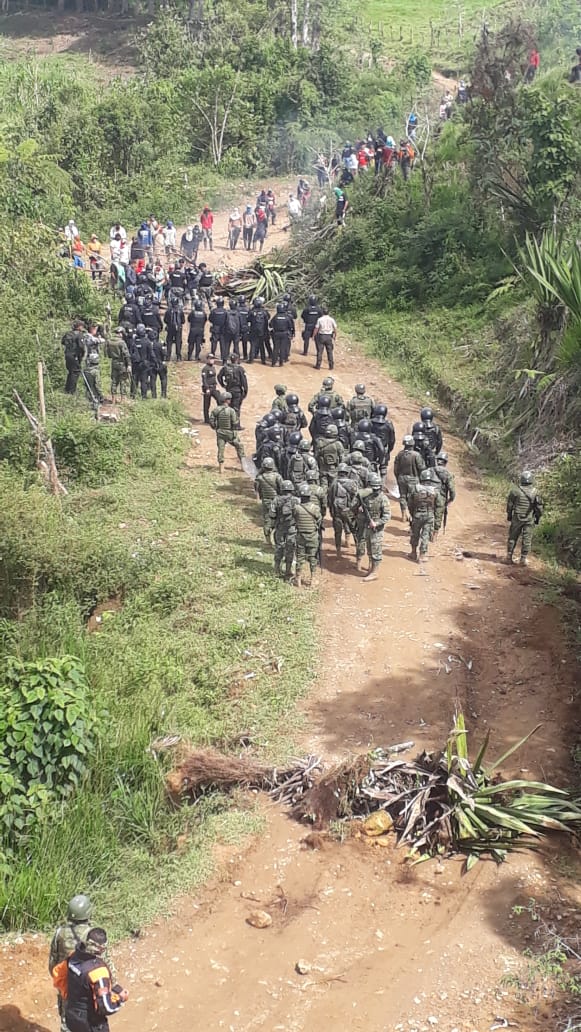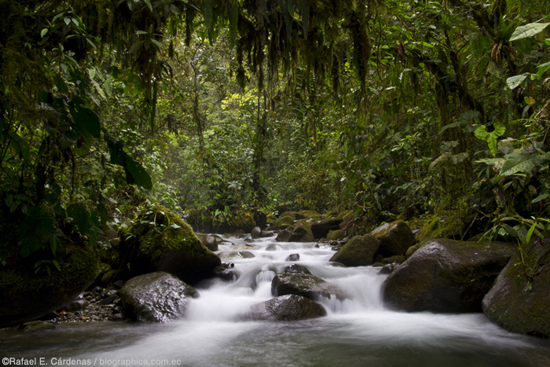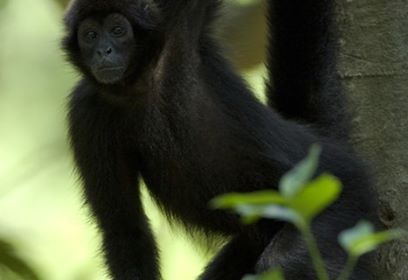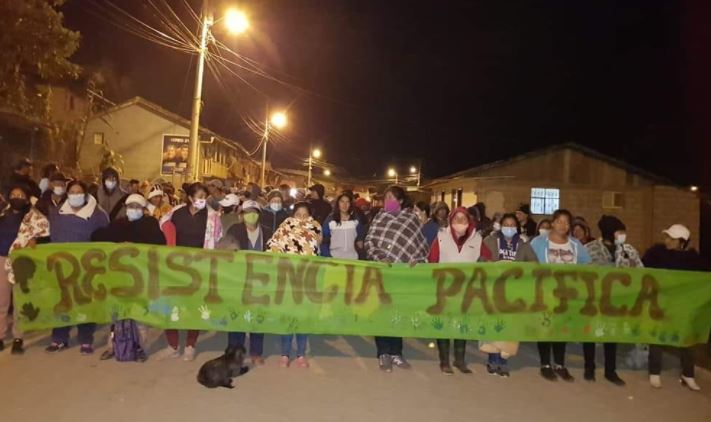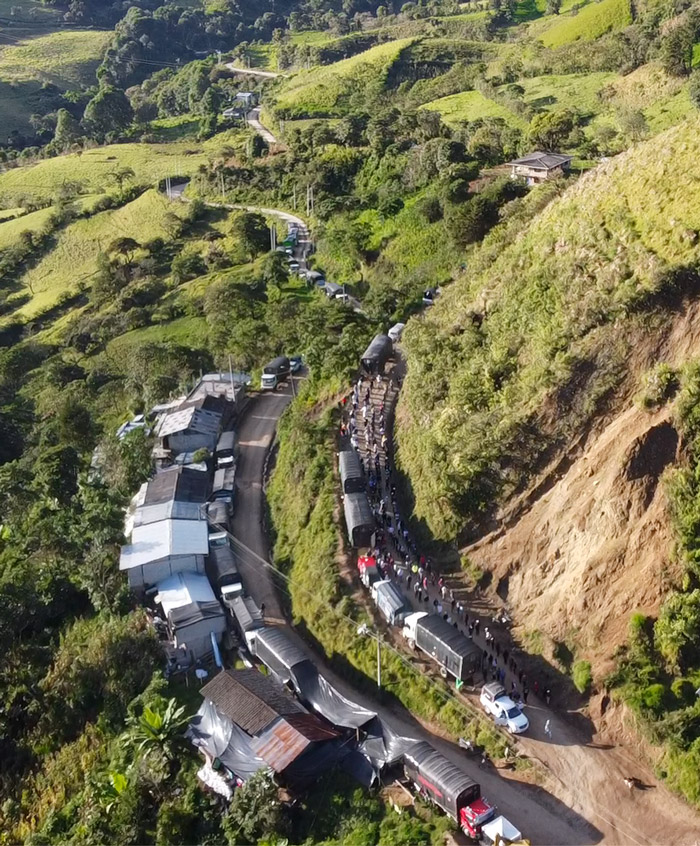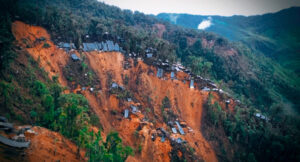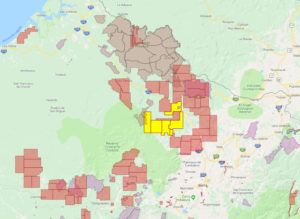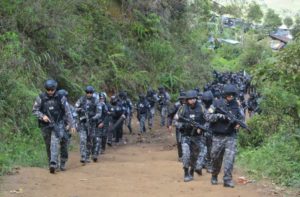Hancock Prospecting in Ecuador: Seven years of reported violations
In 2016-17, Ecuador put a third of its land mass up for sale to mining companies. They came from all over the world eager to explore for copper, gold and other metals, including several Australian heavyweights and juniors: BHP, Newcrest, SolGold, Fortescue Metals, and more. Prominent among the new Australian investors was Hancock Prospecting.

Image credit: Matt Golding, Sydney Morning Herald, June 2019
Seven years on, in 2024, these companies are all busy drilling and establishing projects - leaving behind them a trail of environmental damage and violence as they progress their ambitions. Of the Australian miners, Hancock Prospecting - through its 100% owned subsidiary, Hanrine - has attracted the most news headlines. Let's take a journey through the legacy that this well-endowed private company is creating in Ecuador, one of Latin America's poorest countries.
Find our 2019 shareable PDF fact sheets on Hancock Prospecting (HPPL) in English here and Spanish here. Updates will soon be available on our website.
Introduction
Hanrine is a subsidiary 100% owned by Hancock Prospecting (therefore 76.6% owned by Australia’s richest person, Gina Rinehart). The company was established in Ecuador in 2017.
Hanrine has never had a website. It is very difficult for the public to access information about the company. For its part, Hancock Prospecting has never published any details about Hanrine on its Australian website, apart from its logo.
The CEO of Hanrine, Carlos De Miguel, has a history of military involvement (he was a US Marine) and in the security industry (running a private security company). He had close ties with the Ecuadorian government under the administrations of both ex-presidents Rafael Correa and Lenín Moreno. He was known to be friends with Correa’s Minister of Mines, Javier Cordova and ex-CEO of Ecuadorian state mining company ENAMI, Stevie Gamboa (who, after leaving ENAMI, became the legal advisor for Hanrine).
De Miguel is reputedly linked with privileged information regarding major infrastructure developments in Ecuador and was allegedly involved in a security capacity with the internment of Julian Assange in the Ecuadorian Embassy in London.
2015-2017
2015: Australia signs a Memorandum of Understanding with the State of Ecuador regarding mining cooperation.
2016: The government of ex-president Rafael Correa opens over 2 million hectares of land across Ecuador up to local and transnational companies for mining exploration, without any public knowledge and in alleged violation of Ecuadorian Constitutional Law.
A flood of Australian mining companies move in to Ecuador to buy concessions, securing around 10% of the total transnational mining investment. These companies include BHP, SolGold, Fortescue Metals, Newcrest, Hancock Prospecting, Sunstone, Tempus/Pelorus, and Titan Minerals.
Representatives from Hancock Prospecting visit Ecuador (reportedly four times during the course of 2016). They make a deal with the Ecuadorian state mining company, ENAMI, regarding mining and exploration.
July 2017: Hancock Prospecting forms a new subsidiary - Hanrine Ecuadorian Explorations and Mining - and sets up office in Quito.
2018
Early 2018: Gold is found when contractors start working on a road into the peaceful rural parish of Buenos Aires. This sparks a massive “gold rush”. Up to 12,000 illegal miners quickly converge on the area, many from other countries such as Colombia, Peru and Venezuela. Among them are representatives of extant and former paramilitary groups, including FARC, and narco-trafficking gangs from Colombia and Ecuador. The local population, many of whom are small scale farmers, are overwhelmed. The Ecuadorian Government grapples to deal with the problem, but fails.
March: Hanrine acquires exploration rights to six mining concessions in northern Imbabura, totalling over 27,032 hectares close to the Colombian border and surrounding SolGold’s much-touted Cascabel copper project. This is one of the most biodiverse regions on the planet, and home to several small rural communities, including the Parish of Buenos Aires.
Hanrine’s acquisions are instantly controversial. According to Ecuadorian media reports, Hanrine was awarded the concessions after the new Moreno government pledged to suspend the mining cadastre (registry) and cancel more than 2000 mining concessions – actions promised in the wake of a national referendum when 80% of Ecuadorians voted “no” to the expansion of mining in environmentally vulnerable areas.
Moreover, local communities within the Parish of Buenos Aires have received absolutely no consultation about Hanrine moving into the region (this is not a problem specific to Hanrine; lack of consultation plagues communities all over Ecuador who are suddenly finding themselves on the frontlines of mining exploration).
April: Illegal mining is still concentrated in Hanrine’s active concession, Imba 2. Organised crime gangs are now well- established in the area. Gold is being trucked to San Lorenzo, one of Ecuador’s most dangerous ports. Several deaths of miners occur.
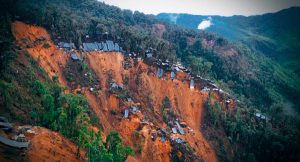
Illegal mining in Hanrine's concession, Buenos Aires Parish, Ecuador. Source: Ecuavisa, 2018.
June: After the death of a 14 year old child, residents of towns and villages within the parish of Buenos Aires protest on the streets, demanding that the illegal miners be evicted. Illegal miners form consortiums and battle for control over mines. Some claim they are dealing with Hanrine, saying they have asked the company for their mining rights to be legalised.
27 September: Concerns are raised about the process by which Hanrine obtained their six concessions in just a few short weeks, rather than the 8 months or more it usually takes to secure mining titles. The assemblyman for Imbabura, Marcelo Simbaña, formalises a complaint before the General Comptroller of the State regarding this and other inconsistencies, and requests a constitutional injunction to stop Hanrine operating in the area.
December: The State of Ecuador sends in the military to address the illegal mining problem. Raids and arrests follow, but these efforts again fail to bring the situation under control.
2019
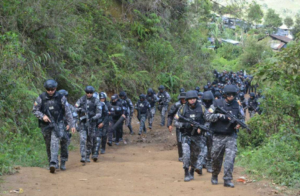
May: Residents of Buenos Aires blockade the main road to illegal mines after locals are shot at in armed confrontation between gangs at the mining sites.
July: From Australia, Hancock Prospecting allegedly requests the State of Ecuador to intervene in the illegal mining situation in their concession Imba 2. The government responds by sending in 1,200 police and 1,500 troops. They create a militarised zone and declare a state of emergency in the region. 5000 illegal miners are evicted and their camps burned. Meanwhile dozens of police officers are arrested and charged for receiving bribes from illegal mining organisation leaders.
2020
January-March: Despite the successful removal of the illegal miners, the area of Buenos Aires remains under military presence. An order by the local Emergency Operations Committee of the Cantón of Urcuquí suspends Hanrine’s activities due to the Covid pandemic; however, Hanrine does not respect this restriction.
Hanrine chases Llurimagua: An article published in the journal Periodismo de Investigation (3 August 2020) reveals that Hanrine has, since 2017, been in battle with Chilean state mining company Codelco for control of a lucrative 49% share with ENAMI in the Llurimagua copper-molybdenum project located in Junín, Intag.
Llurimagua is a highly contested project: planned to be one of the world’s biggest copper mines if built, it would host huge infrastructure (including a vast tailings dam) in a highly flood and earthquake-prone region, which also happens to be in the centre of the world’s number one biodiversity hotspot. Llurimagua has been opposed by the majority of the local community since the beginning. Currently two legal cases have been won against the mining company. The second (March 2023) resulted in a ruling that nullified Codelco’s environmental license due to violation of constitutional laws protecting the Rights of Nature.
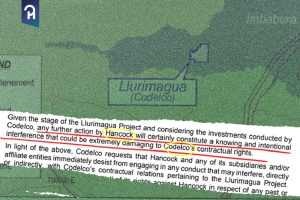
Codelco's letter to Hancock Prospecting. Source: Periodo Investigación.
Allegedly, in the first half of 2020, Hanrine offered the Ecuadorian Government $400 million for the stake in the project and begged the Ecuadorian Government, via dozens of letters, to open the concession up to a tender process. This move angers Codelco, who had received the concession for free in 2016 under a deal with President Correa.
5 June: Codelco's Attorney General in Chile writes to Hancock Prospecting's Executive General Manager in Perth, Australia, saying "Stop interfering in our business...any subsequent action by Hancock will undoubtedly constitute conscious and intentional interference that could be extremely detrimental to Codelco's contractual rights".
July 27: Hanrine’s CEO, Carlos De Miguel, is caught with a stockpile of weapons at his home in Quito and arrested. He is charged with possession of illegal firearms and 9,500 rounds of ammunition. De Miguel’s defense claims that he was set up by the government and falsely charged. He is later released with the charges dropped. It is speculated that the arrest was related to the conflict between the two companies, Hanrine and Codelco, and possibly instigated by the Ecuadorian Government.
August 17: The restrictions on Hanrine’s operations in their Imba 2 concession are finally lifted. Hanrine attempts to enter. On August 21, the communities of Buenos Aires parish gather together, demanding that Hanrine exits Imba 2. Four days later, 180 local people burn down one of Hanrine’s main mining camps.
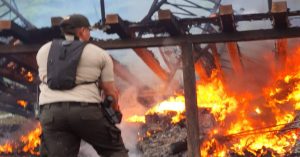
Hanrine's camp burns, August 2020. Source: El Universo
2021
April: The Public Defender’s Office calls on the national government to suspend all Hanrine’s mining activities in the Buenos Aires parish after what it deemed was excessive military force against inhabitants resisting mining. Hanrine contracts a lawyer to threaten the President of the Parish of Buenos Aires, falsely accusing her of violating the company’s constitutional rights by not allowing them access to their concession.
April-June: Buenos Aires residents reiterate that they were not consulted and do not want any mining on their land, and set up a 24-hour vigil to keep Hanrine out.
June: Hundreds of Hanrine workers block the only access road into the town with trucks and machinery for over 40 days, trying to force residents to allow them passage. An Urcuquí judge eventually rules that Hanrine is violating the rights of the Buenos Aires people and gives the company 10 days to withdraw from the public highway.
July: Hanrine allegedly bribes a Quito judge to accept a Protective Action on behalf of the company. The judge’s subsequent ruling hands the national police unprecedented powers to oppress and disperse local protestors.
August 3: In the early hours of the morning, only a matter of days after the court order was given in Quito, Hanrine forces its way through Buenos Aires with over 500 police, who shoot tear gas and rubber bullets at crowds. Police arrest several people without justification or charges and hold them in jail for days. Meanwhile Hanrine gets their machinery through into the hills, sets up camp, and commences exploration activities.
August 18: Imbabura Assemblyman, Mario Ruiz, files a formal complaint expressing concerns about alleged corruption on the part of Hanrine which led to the August 3 events. In October, an investigation by the National Council of the Judiciary in Ecuador confirms the presence of irregularities and manipulation of the judicial computer system in the Protective Action launched by Hanrine in July.
2022
March: After a long campaign by local human rights organisations and the Public Defenders Office, Hanrine’s water use permits are revoked by a court order. The court decides that Hanrine has no legal right to access water for private and agricultural use, and therefore their applications are invalid. Hanrine is banned from accessing their exploration works around the farming area of El Triunfo. Despite this order, Hanrine tries numerous times to sneak back into their camps and restart work.
June 18: In the midst of a national strike, Hanrine uses the cover of a State of Emergency to try (again) to force entry. The army and police use grenades and tear gas in order to clear the streets of citizens. Local news outlets report that five people are injured - one an elderly person who is unable to move after the attack.
There are numerous other reported incidents through the course of 2022, when farmers peacefully try to stop Hanrine entering their private access roads, and are arrested and criminalised – despite the fact that it is the company who is conducting illegal actions.
2023
January: Hanrine engages the army to help them enter private properties around the village of El Triunfo in order to build a new mining camp. Farmers blockade their private access roads and are shot at with rubber bullets. Videos shared on social media show terrifying scenes of running and screaming in the midst of gunshots. The company exits a couple of days later, after being threatened with legal consequences for violation of the March 2022 court order invalidating their water use licenses.
Over the course of 2023: Hanrine, whilst not active in Imba 2, apparently feels no obligation to utilise the police to protect local farmers and townspeople from illegal mining. Therefore the police, while maintaining checkpoints on the entry and exit roads to the town of Buenos Aires, do little to stop hundreds of illegal miners moving back, reinhabiting their camp known as Plastic City, and restarting their mining activities.
Dangerous drug gangs roll in to control the area, including the notorious “Los Lobos”. Violence and crime worsens. Buenos Aires, once a small peaceful town, begins to host night clubs, liquor outlets and brothels. More violent incidents occur, and the residents of Buenos Aires continue to be oppressed by police whenever they attempt to peacefully protest the trespass of Hanrine or illegal miners on their private roads and properties.
November: Without warning, Hanrine removes all machinery from their exploration camps in Imba 2 and lays off its workers.
December 2023-January 2024: Many of Hanrine’s workers, suddenly finding themselves without income, join the illegal miners, swelling the numbers to over 3000. A series of military operations commence, purging and burning camps and equipment.
2024
March: Weeks after their exit from Imba 2, Hanrine expands its activity. Through a back room deal, without respect of Ecuadorian mining laws (which require that concessions be sold through a tender process), Hanrine seals a $150 million partnership with ENAMI, giving them access to a 49% stake in six mining concessions in Intag. The concessions surround the embattled Llurimagua copper-molybdenum project, which has been stalled by investor corruption, environmental concerns and social resistance since 2018.
This move by Hanrine is bold, for two reasons. Firstly, Intag has the longest history of unified resistance against mining in Latin America – four decades of successfully repelling one company after another – and has achieved two legal precedents defending the rights of Nature in the area. Secondly, local community and environmental organisations suspect that Hanrine’s desire to own these concessions has a lot to do with their ambitions for Llurimagua … see below.
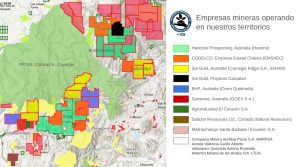
Mining concessions in the province of Imbabura as of March 2024. Hanrine's are in green. Source: APT-Norte.
April: Ecuador’s Constitutional Court rules to invalidate an appeal launched by Codelco and the Ministry of Environment, which attemped to overturn a 2023 Court of Imbabura judgement removing their environmental permit to develop the Llurimagua project.
This ruling, while a positive result for those fighting Llurimagua, raises concerns in local communities that should Codelco give up its share of the mining project, the most likely company to buy it will be Hanrine. If this scenario comes to pass, Hanrine will own over 40,000 hectares of contigious mining concessions across the region of Intag. Furthermore, almost the entire province of Imbabura (with the exception of EMSAEC, Agroindustrial, and private concessions) will be occupied by four Australian mining companies – Hanrine, SolGold, BHP and Sunstone.
April: Hanrine invests $186m ($120m US) in the Linderos copper exploration project in the Ecuadorian province of Loja (owned by a junior Australian company, Titan Minerals) with a view to acquire up to 80% of the project. Gina Rinehart is reportedly committed to increasing her investments in the so-called Andean Copper Belt - copper being an important battery metal - but so far, Ecuador is the only country in the region where she has a footprint. Within the past few months, Rinehart has also bought substantial sized shares in lithium and rare earth metals mines in Australia, Brazil and the United States.
May: Local Intag residents report that Hanrine employees have visited farmers living within their new Guadalupe mining concession in Intag and offered to upgrade access roads to farms.
RAG is working closely with people and communities who are being directly impacted by Hanrine's activities. Many of the events described here and in our linked media releases have been reported first hand from the frontlines, while the remaining references are sourced in Ecuadorian and Australian news media. We will update this timeline as things unfold through 2024.
